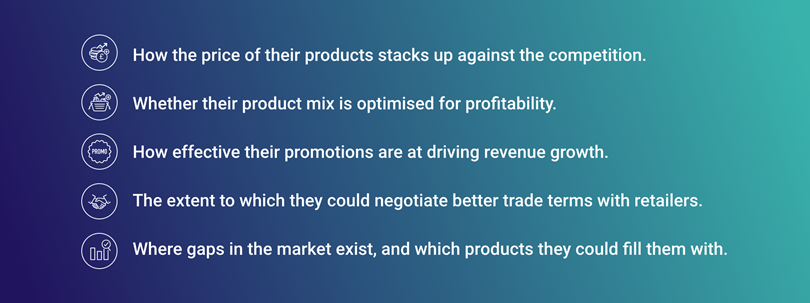Why net revenue management holds the secret to sustainable CPG growth
It’s easy to assume that revenue growth for consumer-packaged goods is a straightforward question of building volume and value sales. But it’s way more complex than that and there are many pitfalls that can be encountered along the way. Find out why effective net revenue management is so important to healthy CPG growth.
All growth is good… isn’t it?
Tempting though it may be to assume that growth is universally positive, the reality is that not all forms of it are the same. That’s particularly true when it comes to revenues – and doubly so now, when the prevailing economic headwinds are as harsh as they are. Growth that can appear to be beneficial on the surface can, in fact, be doing serious damage behind the scenes.
For consumer-packaged goods companies (CPGs), the potential pitfalls around revenue growth are as numerous as they are serious. Promotions can drive volume growth, for example, but they can also be fundamentally unprofitable. New product launches can supercharge sales but cannibalise other lines in the process. The losses that result can be difficult to detect, glossed over as they are by surface-level gains.
It’s for this reason, among others, that some CPGs have started to embrace the principles of net revenue management (NRM).
Maximising good growth
The concept of NRM has gained significant traction over the past few years, and particularly so among the world’s larger CPGs. Originally conceived in the 1980s and used primarily by airlines as a way to manage fluctuating demand, NRM has since become both more prominent and more broadly relevant to business as a whole.
At its core, NRM helps organisations to maximise their net revenue. This is typically achieved through the collective optimisation of pricing, promotional and revenue generation strategies, which in turn requires deep analytical capabilities and a focus on data-driven insights. When NRM is executed well, companies tend to become more profitable, more competitive and more agile.
Today, many of the world’s largest CPGs boast entire NRM functions of their own. These specialist teams take responsibility for everything – from category strategies and analysis of key metrics through to seeking out new opportunities within specific channels and markets. Often, they’ll also work with category and brand managers, as well as sales and marketing teams, to ensure that the overarching NRM vision is delivered in a coherent way.
For those that have the organisational infrastructure needed to support that kind of function, there’s obviously a lot to be gained from having a dedicated team watching over these issues. What about the rest, though? Creating a bespoke NRM function can be a time-intensive and expensive pursuit – one that’s often a step too far for CPGs that don’t have the resources boasted by their gigantic multinational competitors.
That an NRM team might be difficult to set up, of course, doesn’t make the kind of insights it can produce any less appealing. Any CPG brand that wants to develop a better and more constructive dialogue with its retail partners can benefit from the deep knowledge that a dedicated group of revenue management professionals bring to the table. That’s particularly true right now when consumer behaviours are unpredictable, to say the least.
That’s why it is becoming increasingly important for brands at all levels to equip themselves with the kind of data-driven, scientific insights that can fuel deeper and more meaningful revenue growth strategies.
Better insights drive better results
For most CPGs, delivering on the promise of NRM means being able to understand their products, pricing and promotions within the context of the market as a whole. Some of the most important factors that they need to consider include:

For those without a committed NRM team to rely on, getting the answers to these questions is typically an uphill struggle. Some of that information may be available, but much of it will require a huge amount of analysis to achieve – analysis that many CPGs simply don’t have the appetite or capacity for. The alternative, which involves a sizeable amount of guesswork, is a suboptimal solution for brands that want to be certain about the validity of their approach.
Brands aren’t the only ones that need that confidence, of course. If retailers are to take their recommendations to heart, CPGs also need to empower their partners with fact-based insights that use real-world data in favour of best guess and gut feel. What’s more, those insights need to be intuitive, ensuring that they can be presented simply and effectively without the need for deep subject matter expertise.
It’s with this exact situation in mind that dunnhumby developed Revenue Growth Planner, a self-service forecasting tool, which allows brands to understand the impact of different price and promotional scenarios. The tool is powered by three years of transactional data from the UK’s largest retailer, ensuring that it provides an accurate reflection of shopper behaviours based on billions of baskets.
Revenue Growth Planner also employs a powerful machine learning model, generating faster and more accurate results than are possible through manual analysis. Combined with that rich, basket-level data, this enables CPGs to answer some of their most pressing NRM-related questions. With it, they can:
- Simulate the results of changes to factors like base pricing and promotional mechanics. This is vital for predicting the likely impact on volumes, sales, and margins – including any changes to competing brands;
- Use detailed forecasts to inform cost price corridors, rebates and fees. This can help drive better-informed discussions with retailers, resulting in a stronger overall negotiating position;
- Save money on underperforming promotions, which is a fundamental capability for any brand that wants to excel at maximising its net revenue.
Today, creating a more profitable and sustainable proposition should be the top priority for any brand, and NRM can help them to do just that. Now, with the aid of Revenue Growth Planner, any brand – of any size – can embrace those principles, too.
TOPICS
RELATED PRODUCTS
Your strategic price and trade promotion forecasting solution for UK Brands
ExploreThe latest insights from our experts around the world
From pilots to production: how to embed AI in the everyday
Agentic Commerce: How to win and retain customer loyalty
Retail innovation in 2026: Key AI Adoption Themes



